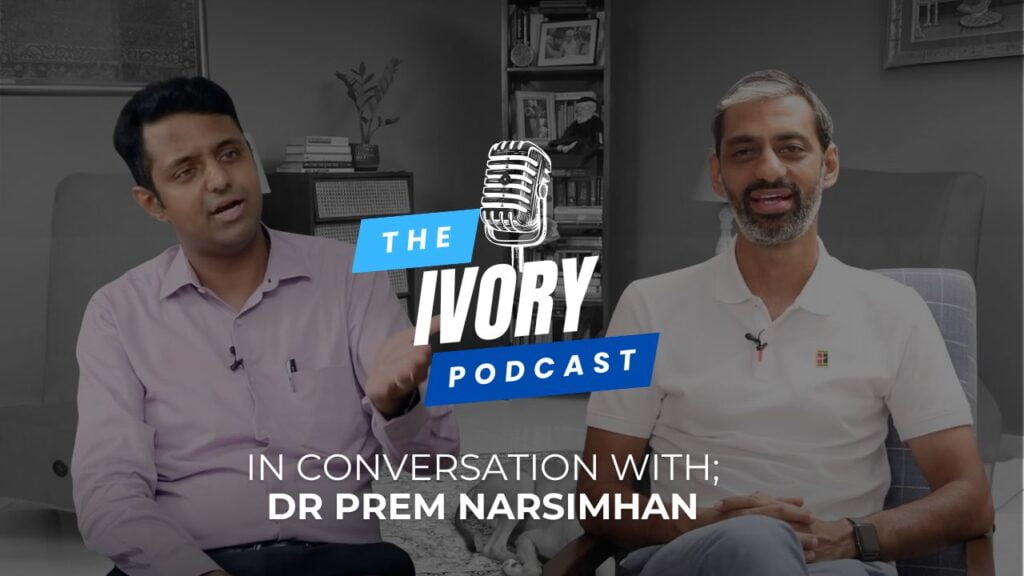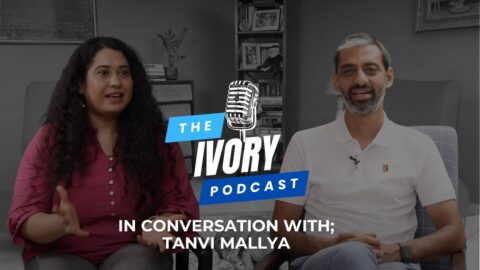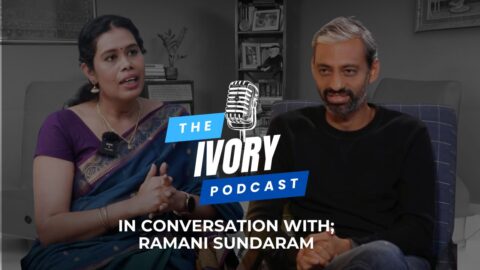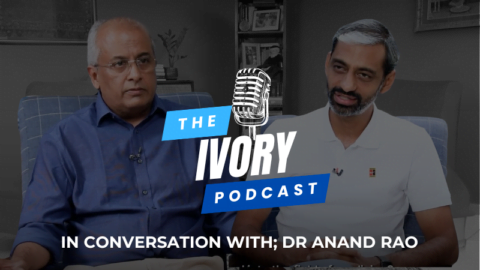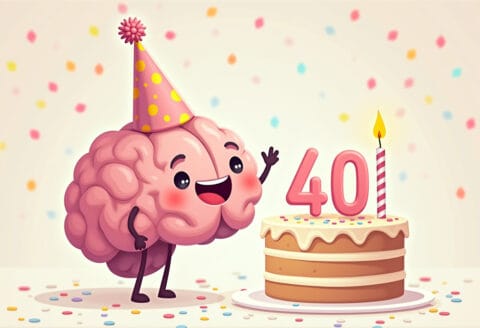First things first, what is the The Ivory Podcast?
“Is ageing gracefully really within our control?”
That’s the question at the heart of The Ivory Podcast. Most health podcasts in India seem to skip over a pretty important group. Yep, we’re talking about the young-at-heart crowd – the ones who’ve celebrated more birthdays than the rest of us.
We bring together a diverse mix of guests, including health coaches, nutritionists, psychologists, doctors, and business professionals. They share insights and truths about the ageing process. It’s not just talk; it’s about understanding what really happens as we grow older. So, join us on the Ivory Podcast. It’s like sitting down for a cup of tea with friends who know a thing or two about growing older gracefully and taking care of our brain health.
Prem Narasimhan: Geriatric Care with dedication, grace and compassion
Here is a little bit of what the Ivory team thinks about him:
Dr. Prem Narasimhan, Chief Consultant of Geriatric Medicine at Jaslok Hospital, brings vast experience and a compassionate approach to elder care including cognitive wellness. His practice, rooted in geriatric medicine, focuses on addressing not only the medical needs of the elderly but also their mental, social, and emotional well-being. He advocates for holistic care, emphasizing that aging is a natural process, but how we age is something we can influence.
Your work in promoting dignity, cognitive health, and quality of life for seniors shines through your lectures and everyday patient interactions.
With Gratitude,
Team Ivory
Now here is a little bit of what you should know about his work:
Dr. Prem Narasimhan is a leading geriatrician, based in Mumbai, practising at Jaslok Hospital. His work revolves around providing holistic and compassionate care to elderly patients, focusing on cognitive wellness. Dr. Prem actively speaks on topics such as dementia, Alzheimer’s, and the broader spectrum of cognitive decline that comes with ageing. His approach combines medical treatment with emotional and mental well-being, helping families and patients navigate the complexities of elder care.
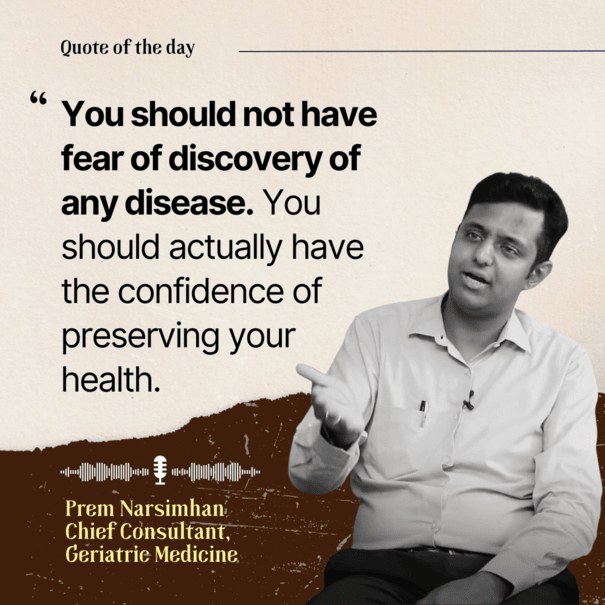
Let’s start 11 questions with Dr Prem:
1. What inspired you to choose geriatric medicine?
Dr. Prem: Geriatrics chose me. Growing up close to my grandparents gave me a soft spot for the elderly, but it was the neglect I saw in their care that made this my calling. The blend of medical expertise and emotional sensitivity drew me in. The elderly have so much to teach, and helping improve their lives is incredibly fulfilling.
2. What are the common misconceptions about ageing and cognitive decline?
Dr. Prem: Many think cognitive decline is inevitable with age. While some memory lapses are normal, not all seniors develop dementia. Preventive care—mental stimulation, social engagement, and medical attention—plays a big role in managing how we age and taking care of our overall cognitive wellness.
3. How has elder care evolved in the last decade?
Dr. Prem: There’s been a shift toward holistic care, especially in urban India. Elder care is now about more than just treating diseases; it’s about improving quality of life with a focus on mental health, cognitive wellness, emotional support, and prevention.
4. What role do family members play in managing cognitive decline?
Dr. Prem: Family is key in elder care. They provide daily support, recognise early signs, and help create a supportive environment. Family involvement in cognitive activities, routines, and emotional support is essential.
5. What early signs of dementia should families watch for?
Dr. Prem: Subtle signs include misplacing items, struggling to recall names or appointments, and difficulty following conversations. If memory issues interfere with daily life, it’s time to consult a professional.
6. How can families prepare for an Alzheimer’s or dementia diagnosis?
Dr. Prem: Preparation involves educating themselves, creating a care plan, ensuring cognitive stimulation, and seeking professional help. Families should also care for their own well-being to avoid burnout.
7. What lifestyle changes help reduce the risk of cognitive decline and improve cognitive wellness?
Dr. Prem: Regular exercise, mental stimulation, social engagement, and a nutrient-rich diet can all reduce risk. Sleep and stress management are also critical to maintaining brain health.
8. What are the biggest challenges in elder care?
Dr. Prem: The lack of awareness is a major challenge. Families often delay seeking help, thinking cognitive decline is normal ageing. We also need more resources and trained professionals to support elderly care.
9. How do you balance medical treatment with emotional support?
Dr. Prem: Medicine only goes so far. Emotional support is just as important. I involve families in the process and ensure the elderly feel heard. Treating the person, not just the disease, is crucial.
10. What advice do you have for young professionals in geriatric medicine?
Dr. Prem: It’s a rewarding field that requires patience and empathy. With a growing elderly population, we need more advocates focused on improving quality of life, not just prolonging it.
11. What’s one thing you want everyone to know about ageing?
Dr. Prem: ageing isn’t something to fear. With the right care, it can be a fulfilling journey. Let’s normalise conversations around ageing and focus on overall well-being, not just treating illnesses.
We’ve summarised this engaging podcast into a Q&A format to highlight the key insights for you. But if you’d like to experience the full conversation, you can listen to the entire episode here.
The Key Takeaways: Impact on Cognitive Wellness
In our engaging conversation with Dr. Prem Narasimhan, we explored the challenges and opportunities in elder care. His insights on preventive care, the role of family in managing cognitive decline, and the need for a holistic approach offer a fresh perspective on ageing.
Dr Prem’s compassionate approach reminds us that while ageing may bring challenges, with the proper care and mindset, it’s possible to age with dignity and grace.
Also read: Eidetic memory: Extraordinary ways our brain remembers
